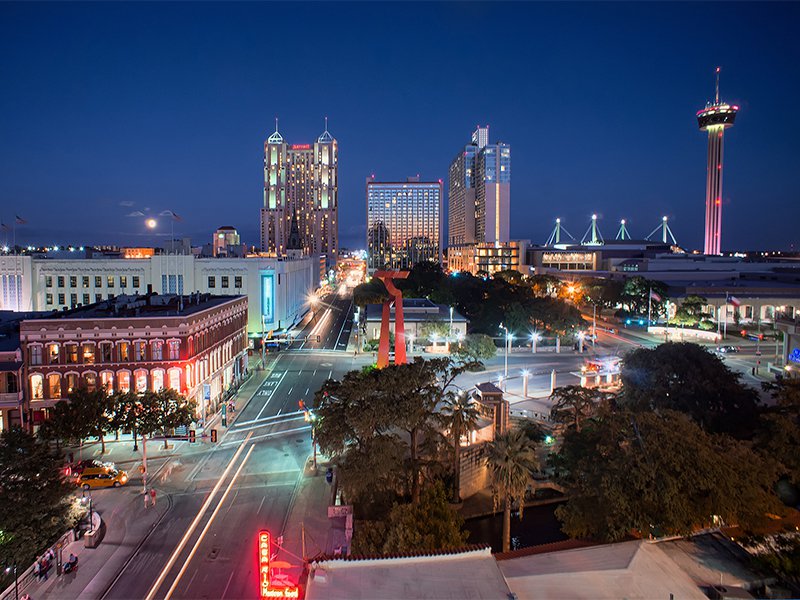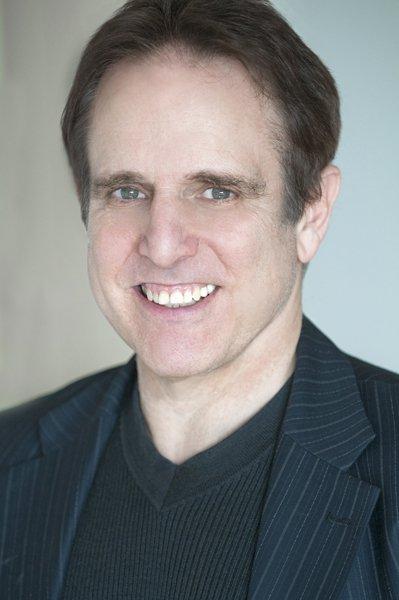
The downtown San Antonio skyline in 2012. An interfaith group plans to advocate for better housing options in the city. (Katie Haugland Bowen/Creative Commons)
An initiative in San Antonio has brought together clergy from different faiths to find a solution for affordable housing in a city where 19 percent of residents live at or below the poverty line.
Unlike interfaith efforts that focus more on dialogue, the San Antonio project attempts to move toward action.
"It gives us something specific to work toward and we hope that as a result of one effort relationships will develop and something more significant will grow out of it in terms of interaction among clergy," said Rabbi Samuel Stahl, who convened the interfaith group, the first of its kind in what is hoped will be a multiple city effort.
In February, 23 leaders from among the city's Catholic, Protestant, Jewish, Muslim and Sikh communities came together to take a vote on the issue they would work on. In May, they will gather again to figure how best to support affordable housing, keep people in neighborhoods that are gentrifying and also help the homeless.
February's two-and-a-half-hour meeting included Catholic Bishop Gustavo Garcia-Siller; Leslie Hollon, pastor of Trinity Baptist Church, one of the city's largest congregations; and Stahl, rabbi emeritus at Temple Beth-El.
"There's a high energy level," said Hollon. "We want to do due diligence effectively and see what will move the needle and make a difference."
Religious leaders in San Antonio say it's been a long time since its clergy members have worked together. The city, the seventh largest in the nation, with a population of 1.5 million, has a history of interfaith collaboration; back in the 1960s, Catholic, Protestant and Jewish clergy worked together to desegregate the city. But interfaith cooperation has mostly stalled since then, though the city has started a new Faith-Based Initiative intended to spur service projects throughout the city.
Advertisement
The interfaith group grew out of a New York University study called the Religious Leadership and Civic Engagement Project. Co-director David Elcott, professor at NYU's Wagner School of Public Service, said the idea is to nudge religious leaders toward a more productive civic engagement.
"Our analysis was that religious leaders were mainly trying to protect what they perceived to be an assault on their religion," said Elcott. "We wanted to turn that around and say, 'Look you have a constructive role to play.' "

Rabbi Steve Gutow (Courtesy of JCPA)
Project organizers want to replicate their model in cities across the nation. Rabbi Steve Gutow, the co-director of the project at NYU, and a native of Dallas picked San Antonio as the first site for the interfaith effort. He is now working with faith leaders in Indianapolis. Next year he hopes to start such coalitions in San Diego, Minneapolis and Lincoln, Neb.
"The key to this project is the doing," he said. "The core idea is to bring together all the actors and do things they all believe in together."
The San Antonio group expects to partner with the mayor's housing policy task force. Lourdes Castro Ramirez who chairs the task force, said a rise in wages has not kept pace with the cost of housing, which has been escalating.
The figure of 19 percent, of San Antonio's residents who live at or below the poverty line, is higher than the national poverty rate of 12.7 percent in 2016.
"We think it's important to create greater housing options for working poor families, senior citizens on fixed income, but also to encourage growth in housing so there's an ability to accommodate the growing population," she said.
In considering what issue to tackle, the interfaith leaders also looked at human trafficking and criminal reform, but affordable housing got the most votes.
The Rev. Ann Helmke, faith liaison for the city of San Antonio, said housing was a smart choice for the group to tackle, though the other issues were just as important.
She said she's been "waiting and watching and praying" for faith leaders to step up. "It has tons of potential," said Helmke, a Lutheran minister. But she said the initial group could use more diversity.
San Antonio is about 63 percent Hispanic — the largest majority-Hispanic city in America — 30 percent white and 7 percent black. Helmke suggested the interfaith group ought to look more like the population itself.
"One of the largest assets of any community is the faith community," she said. "It's a natural resource to engage voices and move information out into the world. We can make some really important changes and movement."







